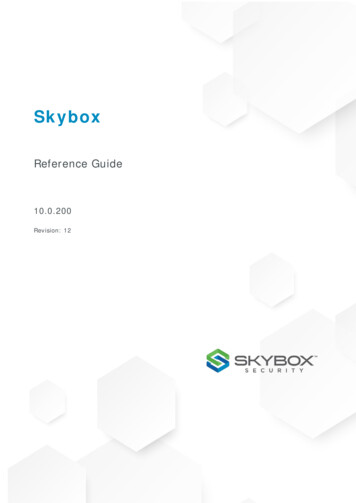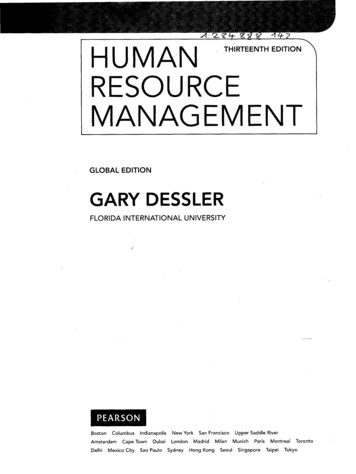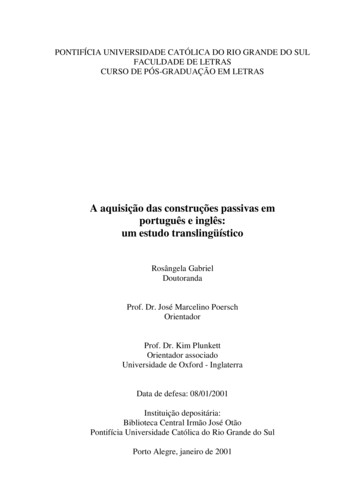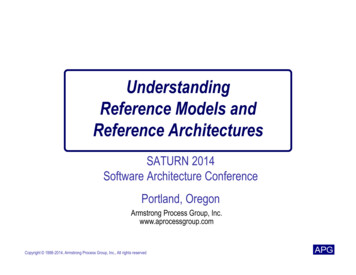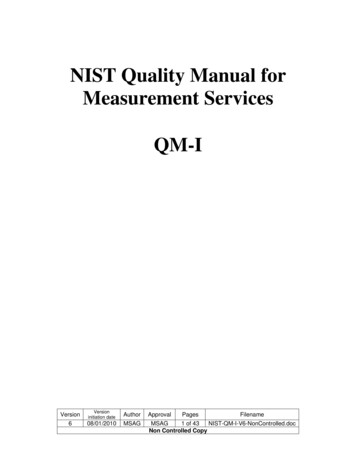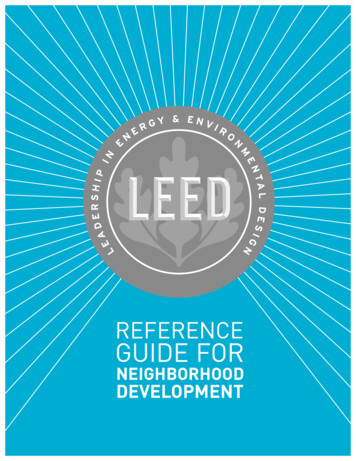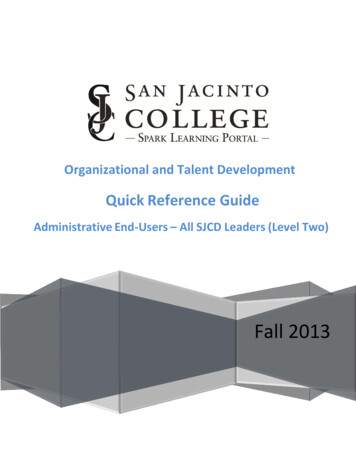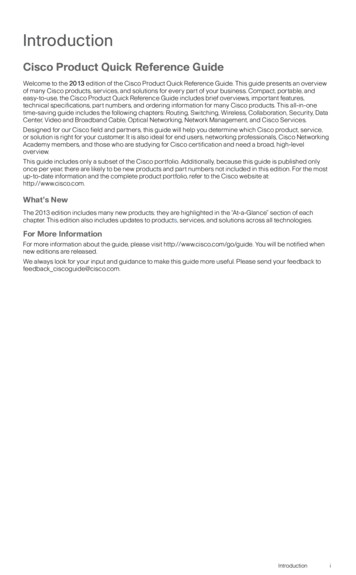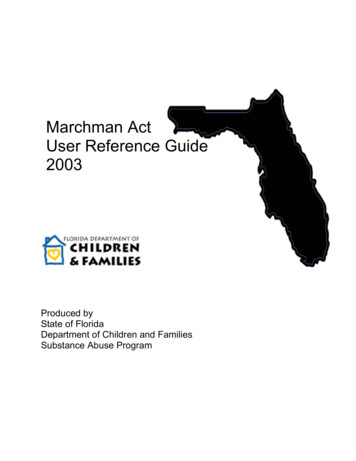
Transcription
Marchman ActUser Reference Guide2003Produced byState of FloridaDepartment of Children and FamiliesSubstance Abuse Program
Marchman Act HandbookTable of ContentsOverview .5Development and Use of Marchman Act Handbook.5Technical Assistance.6History and Overview .7Matrix .13General Provisions.19Legislative Findings, Intent, and Purpose.19Title . .19Definitions.19Client Rights .27Rights of Clients .27Right to Individual Dignity .27Right to Nondiscriminatory Services.27Right to Quality Services .28Right to Communication .28Right to Care and Custody of Personal Effects of Clients .29Right to Education of Minors.29Right to Confidentiality of Client Records .29Right to Counsel .32Right to Habeas Corpus .32Liability and Immunity .32Unlawful Activities Relating to Client Assessment and Treatment; Penalties .32VOLUNTARY ADMISSIONS PROCEDURES .33INVOLUNTARY ADMISSIONS PROCEDURES.33Criteria for Involuntary Admissions .33Service Provider Responsibilities Regarding Involuntary Admissions .34Referral of Involuntarily Admitted Client for Voluntary Treatment .35Release of Client From Protective Custody, Emergency Admission, InvoluntaryAssessment, Involuntary Treatment, and Alternative Involuntary Assessment of aMinor .35Protective Custody.36Protective Custody; Circumstances Justifying .36Protective Custody With Consent .36Protective Custody Without Consent .36Dispositional Alternatives After Protective Custody .37Department to Maintain Lists of Licensed Facilities.37Immunity from Liability.37Emergency Admissions .37Emergency Admission; Circumstances Justifying .38Emergency Admission; Persons Who May Initiate .38Physician’s Certificate for Emergency Admission.38Marchman Act Handbookpage 2
Transportation-Assisted Delivery of Persons for Emergency Assessment .39Disposition Alternatives After Emergency Admission .39Alternative Involuntary Assessmenfor Minors .39Alternative Involuntary Assessment Procedures for Minors .39Disposition of Minor Client Upon Completion of Alternative Involuntary Assessment.40Court Involved Admissions, Civil Involuntary Proceedings; Generally .40Involuntary Petitions .40Court Involved Admissions; Involuntary Assessment; Stabilization .41Involuntary Assessment and Stabilization .41Involuntary Assessment and Stabilization; Contents of Petition .41Involuntary Assessment and Stabilization; Procedure.42Court Determination .42Involuntary Assessment and Stabilization; Responsibility of Licensed Service Provider.43Extension of Time for Completion of Involuntary Assessment and Stabilization .43Involuntary Treatment.44Involuntary Treatment; Persons Who may Petition.45Contents of Petition for Involuntary Treatment .45Duties of Court Upon Filing of Petition for Involuntary Treatment.45Hearing on Petition for Involuntary Treatment .46Court Determination; Effect of Court Order for Involuntary Substance Abuse Treatment.46Early Release From Involuntary Substance Abuse Treatment .47Extension of Involuntary Substance Abuse Treatment Period.48Disposition of Client Upon Completion of Involuntary Substance Abuse Treatment.48LOCAL ORDINANCE PROHIBITION AND AUTHORIZATION; ADMISSIONSPROCEDURES .48Local Ordinances Affecting Impairment and Public Impairment Offenses Forbidden .48Authorization of Local Ordinances for Treatment of Habitual Abusers in Licensed SecureFacilities .49OFFENDER REFERRALS .51Referral of Substance Abuse Impaired Offenders to Service Providers .51Screening, Assessment, and Disposition of Juvenile Offenders.52INMATE SUBSTANCE ABUSE PROGRAMS .52Scope of Part.52Definitions.53Duties and Responsibilities of the Department of Corrections.53Marchman Act Handbookpage 3
Appendix A: Marchman Act and Related Laws.56Appendix B: Client Rights .63Appendix C: Voluntary Admissions.69Appendix D: Law Enforcement and the Marchman Act Protective Custody.70Appendix E: Emergency Substance Abuse Admissions and Persons withEmergency Medical Conditions .78Appendix F: Alternative Involuntary Assessment for Minors Juvenile EmergencyProcedures & Children’s Substance Abuse Services .88Appendix G: Involuntary Substance Abuse Assessment and Stabilization.94Appendix H: Involuntary Treatment.106Appendix I: Consent for Admission and Treatment for Minors.115Appendix J: Offender Referrals Treatment-Based Drug Courts.124Appendix K: Habitual Abusers .128Appendix L: Inmate Substance Abuse Programs.130Appendix M: Marchman Act and Elders .132Appendix N: Marchman Act Notices.141Appendix O: Marchman Act Case Law .143Appendix P: Where to Go for Help.149Appendix Q: Duties of the Department Licensure.156Appendix R: Common Licensing Standards.181Appendix S: Substance Abuse Program Standards .200Appendix T: Marchman Act Tools.225Marchman Act Power Point Presentation.229Marchman Act Forms.255Marchman Act Handbookpage 4
OverviewDevelopment and Use of Marchman Act HandbookUse of HandbookThis Handbook is intended to be used for information purposes only. The information presentedherein is not legally binding and does not have any legal authority. Only Chapters 397, F.S., 65D30, F.A.C., and federal laws/regulations have legal authority.The creation of administrative rules to implement and clarify statute is governed by Chapter 120,F.S. Thus state law prohibits repetition of statute in administrative rules. Therefore, persons mustbe familiar with and routinely reference both the statutes and the corresponding rules to ensurecorrect implementation of the Marchman Act law.Substantial sections of the Appendices have been taken from the Florida Drug Control Strategy,published by the Office of Drug Control in the Executive Office of the Governor.For training purposes, that statute and the corresponding administrative rules concerning the samesubjects have been displayed side-by-side; statutes are sequentially displayed in the left column ofeach page in numerical order. The corresponding administrative rules are sequentially displayedin the right column. However, some rules are intentionally listed out of numerical sequence todisplay them next to the statute to which they refer. Other rules pertaining to program standards,licensing standards, Children’s Substance Abuse Services, and other sections to which no specificstatute is referenced have been omitted from the side-by-side display and are located inAppendices.Substance Abuse WebsiteThe primary website for Department of Children and Family Services’ Substance Abuse Programwebsite is MyFlorida.comStep 1. Go to www.MyFlorida.com and in the column on the right and click on the category“government”Step 2. Click on Executive BranchStep 3. Under State Agencies and Organizations, click on Department of Children andFamilies.Step 4. Under Children and Family Services, click on Substance Abuse and Mental HealthStep 5. Click on any one of the following subjects: Substance Abuse for current news and special reports Reports and Publications for plans, rules, policies, forms and other documents Provider Search to obtain information on how to contact substance abuse and mentalhealth providers in all of Florida’s counties. Links and Resources to link to state, federal, substance abuse, prevention, and mentalhealth resources. Contact Us for a list of district personnel, addresses, and telephone numbers.Marchman Act Handbookpage 5
Marchman ActTechnical AssistanceShould you have questions about the Marchman Act or access to substance abuseinformation or services, contact the substance abuse program staff at the Department ofChildren and Family Services, as indicated akerBradfordBayColumbiaWJacksonCalhounrs onHolmesOkaloosa dsSarasota De SotoCharlotteW15St. LucieMartinGladesPalm BeachHendryLeeNBrevardIndian RivereeobcheeOkDistricts / OGISCentral Office GIS994-7436updated 3.6.01District Substance Abuse Prevention Coordinators:District 1Susan Sweeney 850 595-8366District 9Cathy Claud 561 540-5660District 2Jonn Shelton 850 488-2419District 10954 713-3026District 3Cynthia Tyson 352 955-5053District 11Karlene Tomlinson 305 349-1322District 4Jan Holder 904 723-2014District 12Angela Jackson 386 254-3744Suncoast.Bob Holm 813 558-5715District 13Troy McDermott 352 330-2177District 7Eric Butler 407 245-0420District 14Jim Mosley 863 619-4171District 8Elizabeth Drake 941 338-1272District 15George Woodley 561 467-552Marchman Act Handbookpage 6
Marchman ActHistory and OverviewHistoryIn 1970 the Florida Legislature enactedChapter 397 governing the Treatment andRehabilitation of Drug Dependents in 1970.The following year, it enacted Chapter 396titled the Myers Act as the state’s“Comprehensive Alcoholism Prevention,Control, and Treatment Act”, modeled afterthe federal Hughes Act. Each of theselaws, each governing different aspects ofaddictionhadadifferentFloridaAdministrative Code (or rules) promulgatedby the state to fully implement therespective pieces of legislation.Since persons with substance abuse issuesoften don’t contain their misuse to onesubstance or another, having two separatelaws dealing with the prevention andtreatment of addiction was cumbersomeand did not address the problems faced byFlorida’s citizens.In 1993 Representative Steven Wise ofJacksonville introduced legislation tocombine chapters 396 and 397 of FloridaStatutes into a single law that clearly spelledout legislative intent, licensure of serviceproviders, client rights, voluntary andinvoluntary admissions, offender and inmateprograms,servicecoordination,andchildren’s substance abuse services.The statute was named the Hal S.Marchman Alcohol and Other Drug ServicesAct of 1993 -- generally referred to as theMarchman Act. The Act was named afterRev. Hal. S. Marchman, a tireless advocatefor persons who suffer from alcoholism anddrug abuse, who was recognized by theLegislature for his contributions addressingthe delivery of substance abuse services. aprominent advocate for improved substanceabuse services.To implement the new chapter 397, FloridaAdministrative Code was developed toprovide the standards that service providersmust uphold in order to be licensed to servepersons with addictions. It also provideddetailed policies governing the entirelicensing process as well as otherprovisions. These rules are identified asChapter65D-30oftheFloridaAdministrative Code. These rules havespecific legislative authority. Since the rulescannot restate language from the statute, itis critical that individuals are aware of theprovision from the law AND the rules inorder to carry out the law, protect theiragencies from liability, and protect theirclients from harm.Related Legislation(see Appendix A for more detail)The Marchman Act is the Florida SubstanceAbuse Impairment Act and it does not serveany other purpose. For many persons, theuse of other statutes may be moreappropriate.Alternative statutes mayinclude:The Florida Mental Health Act --The BakerAct Chapter 394, F.S. governs all issuesrelated to mental illness. The definition substanceabuseimpairment.Developmental Disabilities, Chapter 393,F.S., governs all disorders or syndromesthat are attributable to retardation, cerebralpalsy, autism, spina bifida or Prader-WiliSyndrome and that constitute a substantialhandicap that can reasonably be expectedto continue indefinitely.Emergency Examination and Treatmentof Incapacitated Persons Act s. 401.445,F.S. governs EMS examination andtreatment without consent where anMarchman Act Handbookpage 7
emergency medical condition is a lifethreatening one.EMTALA/COBRA, 42 USC 1395dd Afederal statute prohibiting hospitals to delayor deny emergency medical services,including psychiatric and substance abuseemergencies. The law requires that eachpatient must have a medical screeningconducted within the full capability andcapacity of the hospital and must bestabilized before a transfer or dischargetakes place.Access to Emergency Services and Care.395.1041, F.S. is a state statute, equivalentof the federal EMTALA/COBRA law,prohibiting the denial of emergency servicesand care by hospitals and physicians andenforcing the ability of persons to get allnecessary and appropriate emergency carewithin the capability and capacity of eachhospital.This statute also requireshospitals to adhere to rights and involuntaryexamination procedures provided by theBaker Act, regardless of whether thehospital is designated as a receiving ortreatment facility.Adult Abuse, Neglect, and Exploitations.415.1051, F.S. is a state statute that may beappropriate when a vulnerable adult (elderlyor disabled) is alleged to be a victim ofabuse, neglect, or exploitation and lacks thecapacity to consent. This means a mentalimpairment that causes a person to lacksufficient understanding or capacity to makeor communicate responsible decisionsconcerning his person or property, includingwhether or not to accept protective servicesfrom DCF.Advance Directive. Chapter 765, F.S.provides that if a person has previouslyexecuted an advance directive designatinga health care surrogate and a physician hasfound the person to be incompetent orincapacitated to consent to his/her owntreatment, the surrogate may instead beasked to provide such consent.In theabsence of an advance directive, a healthcare proxy may be notified, if a personmeeting the degree of relationship isavailable to serve.Guardianship. Chapter 744, F.S. governsguardianship procedures. Some persons,due to their incapacity, require either alimited or a plenary guardian appointed bythe court to make many life decisions. Anincapacitated person is one who has beenjudicially determined to lack the capacity tomanage at least some of his/her property orto meet at least some of the essential healthand safety requirements of such person.Legislative IntentThe 1993 Florida Legislature studied issuessurrounding the use and abuse of alcoholand other drugs. The legislators made thefollowing findings:1. Substance abuse is a major healthproblem and leads to such t, chronic addiction, criminalbehavior, vehicular casualties, spiralinghealth care costs, AIDS, and businesslosses, and profoundly affects the learningability of children within our schools andeducational systems. Substance abuseimpairment is a disease, which affects thewhole family and the whole society andrequiresspecializedprevention,intervention, and treatment services thatsupport and strengthen the family unit.2. Provide for a comprehensive continuumof accessible and quality substance abuseprevention, intervention, and treatmentservices in the least restrictive environmentof optimum care that protects and respectsthe rights of clients, especially forinvoluntary admissions, primarily rs working with local governmentalprograms involving a wide range ofagencies from both the public and privatesectors.Marchman Act Handbookpage 8
3, Ensure within available resources a fullcontinuum of substance abuse servicesbased on projected identified needs,delivered without discrimination and withadequate provision for specialized needs.4. Discouragesubstanceabusebypromoting healthy lifestyles and drug-freeschools, workplaces, and communities.5. Integrate program evaluation efforts,adequate administrative support services,and quality assurance strategies with directservice provision requirements and toensure funds for these purposes.6. Require the cooperation of departmentalprograms, services, and program offices inachieving the goals of this chapter andaddressing the needs of clients.7. Provide, for substance abuse impairedadult and juvenile offenders, an alternativeto criminal imprisonment by encouraging thereferral of such offenders to serviceproviders not generally available within thecorrectional system instead of or in additionto criminal penalties.8. Provide, within the limits of appropriationsand safe management of the correctionalsystem, substance abuse services tosubstance abuse impaired offenders whoare incarcerated within the Department ofCorrections, in order to better enable theseinmates to adjust to the conditions of societypresented to them when their terms ofincarceration end.9. Provide for assisting substance abuseimpaired persons primarily through healthand other rehabilitative services in order torelieve the police, courts, correctionalinstitutions, and other criminal justiceagencies of a burden that interferes withtheir ability to protect people, apprehendoffenders, and maintain safe and orderlycommunities.10. Establish a clear framework for thecomprehensive provision of substanceabuse services in the context of acoordinated and orderly system.11. Freedom of religion of all citizens shallbe inviolate. Nothing in this act shall giveany governmental entity jurisdiction toregulate religious, spiritual, or ecclesiasticalservices.Client RightsThe Marchman Act provides an array ofstatutorily protected rights of personsseeking and or receiving substance abuseservices as well as due process rights ofthose persons for whom involuntaryinterventions are sought. These include:1.INDIVIDUAL DIGNITY must berespected at all times and upon alloccasions, including any occasion when theclient is admitted, retained, or transported.Substance abuse clients who are notaccused of a crime or delinquent act maynot be detained or incarcerated in jails,detention centers, or training schools of thestate, except for purposes of protectivecustody in strict accordance with thischapter. A client may not be deprived of anyconstitutional right.2.NONDISCRIMINATORY SERVICESService providers may not deny a clientaccess to substance abuse services solelyon the basis of race, gender, ethnicity, age,sexual preference, HIV status, prior servicedeparturesagainstmedicaladvice,disability, or number of relapse episodes.Service providers may not deny a client whotakes medication prescribed by a physicianaccess to substance abuse services solelyon that basis. Service providers who receivestate funds to provide substance abuseservices may not, provided space andsufficient state resources are available,deny a client access to services basedsolely on inability to pay.3. QUALITY SERVICES. Each client mustbe delivered services suited to his or herneeds, administered skillfully, safely,humanely, with full respect for his or herMarchman Act Handbookpage 9
dignity and personal integrity, and inaccordance with all statutory and regulatoryrequirements. Each client in treatment mustbe afforded the opportunity to participate inthe formulation and periodic review of his orher individualized treatment or service planto the extent of his or her ability to soparticipate. It is the policy of the state to usethe least restrictive and most appropriateservices available, based on the needs andthe best interests of the client andconsistent with optimum care of the client.Each client must be afforded the opportunityto participate in activities designed toenhance self-image.4. COMMUNICATION. Each client has theright to communicate freely and privatelywith other persons within the limitationsimposed by service provider policy.Because the delivery of services can onlybe effective in a substance abuse freeenvironment, close supervision of eachclient'scommunicationsandcorrespondence is necessary, particularly inthe initial stages of treatment, and theservice provider must therefore setreasonable rules for telephone, mail, andvisitation rights, giving primary considerationto the well-being and safety of clients, staff,and the community. It is the duty of theservice provider to inform the client and hisor her family if the family is involved at thetime of admission about the provider's rulesrelatingtocommunicationsandcorrespondence.5. CARE AND CUSTODY OF PERSONALEFFECTS. A client has the right to possessclothing and other personal effects. Theservice provider may take temporarycustody of the client's personal effects onlywhen required for medical or safetyreasons, with the reason for taking custodyand a list of the personal effects recorded inthe client's clinical record.6. EDUCATION OF MINORS. Each minorclient in a residential service component isguaranteededucationandtrainingappropriate to his or her needs. The serviceprovider shall coordinate with localeducation agencies to ensure that educationand training is provided to each minor clientin accordance with other applicable lawsandregulationsandthatparentalresponsibilities related to such educationand training are established within theprovisions of such applicable laws andregulations. Nothing in this chapter may beconstrued to relieve any local educationauthority of its obligation under law toprovide a free and appropriate education toevery child.7. CONFIDENTIALITYOFCLIENTRECORDS. The records of serviceproviders which pertain to the identity,diagnosis, and prognosis of and serviceprovision to any individual client areconfidential in accordance with this chapterand with applicable federal confidentialityregulations and are exempt from theprovisions of s. 119.07(1) and s. 24(a), Art. Iof the State Constitution. Such records maynot be disclosed without the written consentof the client to whom they pertain exceptthat appropriate disclosure may be madewithout such consent:8. COUNSEL. Each client must beinformed that he or she has the right to berepresented by counsel in any involuntaryproceeding for assessment, stabilization, ortreatment and that he or she, or if the clientis a minor his or her parent, legal guardian,or legal custodian, may apply immediatelyto the court to have an attorney appointed ifhe or she cannot afford one.9. HABEAS CORPUS. At any time, andwithout notice, a client involuntarily retainedby a provider, or the client's parent,guardian, custodian, or attorney on behalf ofthe client, may petition for a writ of habeascorpus to question the cause and legality ofsuch retention and request that the courtissue a writ for the client's release.10. LIABILITY AND IMMUNITY. Serviceprovider personnel who violate or abuse anyright or privilege of a client under thisMarchman Act Handbookpage 10
chapter are liable for damages asdetermined by law. All persons acting ingood faith, reasonably, and withoutnegligenceinconnectionwiththepreparation or execution of ts or the apprehension, detention,discharge, examination, transportation, ortreatment of a person under the provisionsof this chapter shall be free from all liability,civil or criminal, by reason of such acts.Voluntary Admissionpetitions to the circuit court. The three noncourt procedures are: However, the law also offers two courtrelated procedures, including: A person, whether adult or minor, whowishes to enter treatment for substanceabuse may apply to a service providerfor voluntary admission.Within thefinancial and space capabilities of
Marchman Act Handbook page 5 Overview Development and Use of Marchman Act Handbook Use of Handbook This Handbook is intended to be used for information purposes only. The information presented herein is not legally binding and does no
